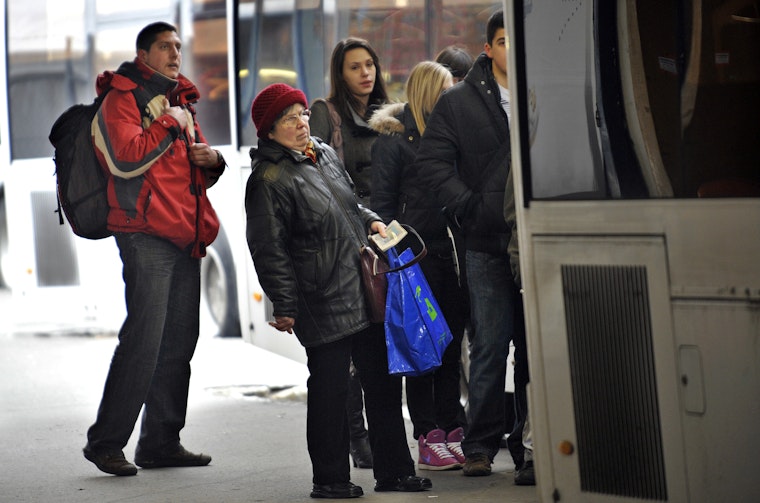In Hungary, a Better Transit System Fueled by the Power of Citizen Engagement
By Levente Lintényi

The train that runs from Mátészalka, a town of 17,000 in northeastern Hungary, to Nyíregyháza, the county capital, is ridiculously expensive and painfully slow. Taking over two hours to cover the 35-mile journey, for years Mátészalka’s only transit link made meaningful growth nearly impossible due to its high fares and languid pace.
Today, things are different. Regular buses connect the town to the capital, condensing commute times to half an hour and vastly improving quality of life for residents of Mátészalka. This is just one of the many victories that were possible thanks to the effective mobilization and campaigning of the citizens of Mátészalka over the last year.
People here joke that the improvement in bus service is Mátészalka’s second-most noteworthy achievement, after its local renown as the birthplace of actor Tony Curtis’s father. But joking aside, the history of our town illustrates why advocating for our rights has not always come naturally to us, and why something as simple as better bus service is a giant step forward.
At the heart of one of the most socioeconomically disadvantaged areas of Hungary, Mátészalka, the second-largest town in Szabolcs County, has for years been overlooked by the authorities for development. Except for some recent industrial initiatives, there are few opportunities for residents, and unemployment has long been high. There is a large Roma population that—as in the rest of the country—is restricted to segregated areas where public transit is even worse.
Most people, like myself, work in factories or as public workers. The latter are state-subsidized jobs with the local government, are typically underpaid, and in practice, substitute for unemployment benefits. The low turnout in the last local and national elections—less than 40 percent—is indicative of people’s disillusionment with politics and their general apathy when it comes to voicing opinions and exercising rights.
When I moved to Mátészalka almost seven years ago, I was struck by the lack of community spaces and civic life; it was rare for different groups to come together and exchange ideas. Our community faced many problems, but we didn’t have the necessary civic culture to address them.
The only course of action was through our trade union, which wasn’t a proper mechanism for solving some of our most pressing problems. To fix broken systems like the poor public transportation system, we needed a way to revitalize life in the city and get buy-in from as many citizens as possible.
With the support of the Open Society Initiative for Europe’s Hungary Project, we started out as a small community-organizing group, and soon grew to 30 committed members. Our intention was to involve people from many backgrounds to gain real insight into our town’s problems. The diversity also positioned us to exert pressure on decision makers, and we now have representatives from each community, including many Roma members, comprising a network of over 250 people. Earning people’s trust and getting them involved took time and meticulous effort. Our meetings grew over time and are now a familiar point for community members to gather.
We interviewed more than 300 residents of Mátészalka to help us understand which causes we should focus on. Topping their lists of concerns were the city’s limited green spaces, its poor transportation infrastructure, and the lack of newspapers featuring local news.
In response, we launched a local newspaper and established a sister blog called Mátészalkaleaks [site in Hungarian], its name alluding to our call for greater citizen participation and accountability. The blog and related Facebook group have now become the primary portals through which we expose such problems, discuss solutions, and share community news.
This is where we started publicizing our request to establish regular bus service connecting Mátészalka to the county capital of Nyíregyháza. One blog post about this was shared over 250,000 times. We wrote hundreds of letters to the mayor asking him to negotiate on our behalf, and organized attention-grabbing community events about the issue. Through the local municipality, we targeted the minister for development, and on March 21, 2016, managed to convince him to make the state-owned bus company add the new routes to our town.
Now, with more than 10 daily connections to the capital—and frequent weekend routes using the shorter, faster interstate highway—the people of Mátészalka have easy access to a substantial job market in Nyíregyháza.
Our victory was covered by many Hungarian media outlets and inspired the planning of analogous actions in towns similar to ours. By building a critical mass of advocates, we were able to get what we needed from the local authorities. Thanks to the commitment of the people of Mátészalka, we have enough donations to confront more community problems—both small and big—that we once accepted as inevitable, and to roll out this practical model of community organizing to other towns across the county. We hope our efforts will inspire change in those places, too.
Mátészalkaleaks is a grantee of the Open Society Foundations.
Levente Lintényi is coordinator of the Mátészalka Community Group.